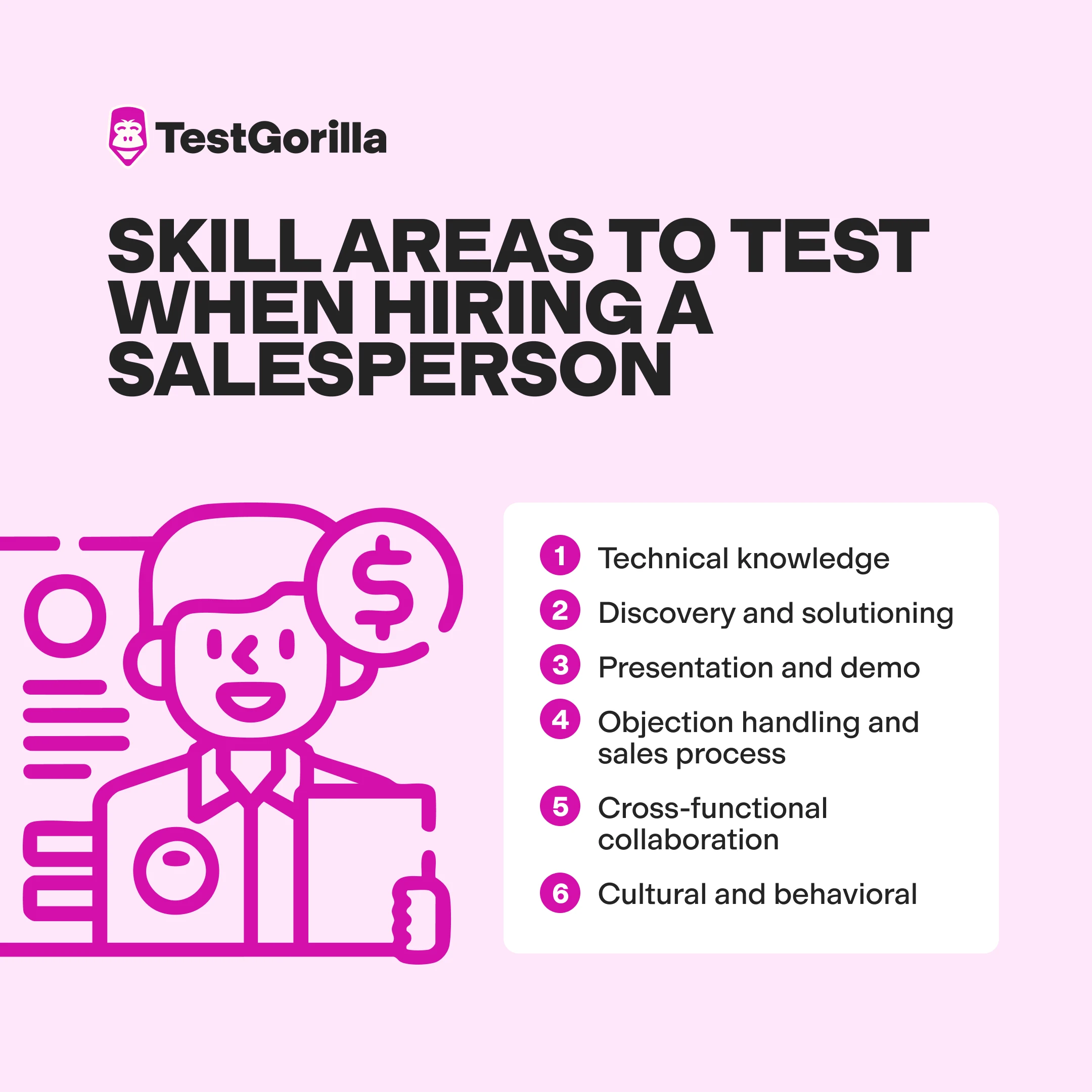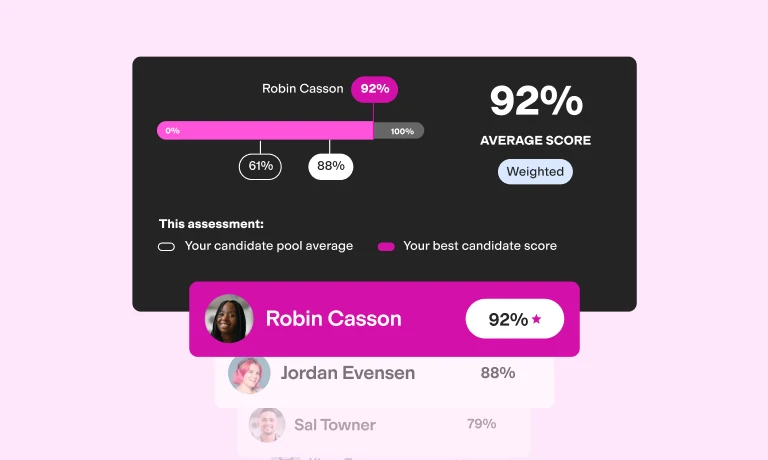28 sales aptitude interview questions
Some sales candidates can talk a big game in interviews, but when they’re on the job, they can’t land deals, nurture pipelines, or build lasting customer relationships.
It’s a common problem because most interviews don’t reveal true sales skills, like curiosity, coachability, resilience, and the ability to consistently qualify leads and close deals.
At TestGorilla, we believe hiring should be based on skills, not just confidence. The 28 sales interview questions below are built to help you measure real sales aptitude in your candidates. And when combined with our Sales Aptitude test, they’ll help you make smarter, faster, more objective hiring decisions.
What makes a great sales employee?
First off, what makes for a top-performing sales employee?
What separates the okay from the exceptional is simple: Great salespeople do more than sell. This is because in modern sales environments, success depends on intellect, adaptability, a genuine interest in people, and strong communication.
Top-performing salespeople share a handful of key behaviors that consistently set them apart:
They understand what they’re selling and why it matters. They don’t just memorize product features. They delve deeply into how the product works and how it addresses real customer problems.
They ask the right questions and keep digging. Great reps don’t stop at surface-level discovery. They use sharp follow-up questions to uncover unspoken pain points and guide prospects to the most valuable solutions.
They communicate with clarity and purpose. Whether they’re talking to a CFO or a first-time buyer, they tailor their pitch, explain complex topics without jargon, and adjust in real-time based on audience cues.
They collaborate across teams. Sales success rarely happens in isolation. High performers sync with product teams to resolve technical blockers, work with legal on contracts, and team up with customer success to retain and grow accounts.
They lead with a customer-first mindset. Rather than pushing a generic solution, they focus on long-term value and build lasting relationships based on insight and trust.
Why standard interviews don’t work for sales roles
To find and hire these sales superstars, you can’t rely on standard interviews – not because they’re too “basic” but because they aren’t well-balanced or well-targeted.
Most sales interviews represent one of two extremes: They ask overly technical questions that overlook key interpersonal strengths (like storytelling and persuasiveness), or they focus on vague prompts that assess confidence but not capability.
Whether you're hiring your first sales rep or expanding your current team, you need to ask the right interview questions - ones that surface how candidates think, react, and sell when the stakes are high and the answers aren't obvious.
The best insights on HR and recruitment, delivered to your inbox.
Biweekly updates. No spam. Unsubscribe any time.
28 interview questions to evaluate sales aptitude
To uncover true sales aptitude, you need to go way beyond generic prompts.
The following categories break down interview questions by skill area – from technical fluency to objection handling to cross-functional collaboration – so you can understand candidates’ real-world performance.
We’ve also included some follow-up questions to get an even clearer picture of candidates’ sales aptitude.
Technical knowledge questions
In SaaS and other technical sales roles, reps need genuine technical understanding: how a product works, where it fits in a customer’s tech stack, and how to simplify its complexity without losing accuracy.
The questions below help reveal a candidate’s technical fluency, not just in understanding your product but in translating that value to different audiences.
1. Walk me through a time when you explained a complex technical concept to a non-technical client. What was the outcome?
Follow-up: How did you check whether the client understood your explanation?
2. How do you stay up to date with the systems, tools, or APIs your product relies on?
Follow-up: Can you share an example where this knowledge directly helped you win or save a deal?
3. Tell me about a situation where a technical limitation risked losing a customer. How did you handle it?
Follow-up: What was your approach to ensuring transparency while preserving customer satisfaction?
Discovery and solutioning questions
Strong discovery skills are at the heart of successful selling. The best salespeople ask sharp, open-ended questions to uncover business pain points, then guide prospects to meaningful solutions.
Use these sales aptitude interview questions to learn how well a candidate understands the customer, adapts to their job role, and aligns value with need.
4. How do you structure your discovery calls to uncover both technical and business needs?
Follow-up: What signs tell you it’s time to dig deeper into a pain point – or switch gears entirely?
5. Can you give an example of a time you uncovered a problem the client didn’t initially mention?
Follow-up: How did that insight change your proposed solution?
6. Tell me about a deal where you had to tailor your pitch significantly from your standard approach. What did you adjust, and what was the impact?
7. How do you handle a situation where a client thinks they know exactly what they want, but you believe another solution is a better fit?
Presentation and demo questions
Sales aptitude doesn’t live in discovery or negotiation only – it shows up clearly in how someone presents a solution. This is where communication style, confidence, adaptability, and customer focus all intersect.
These questions help you assess how candidates present value, manage shifting attention spans, work under a time limit, and recover when things go off-script.
8. Imagine you have five minutes to pitch our product to a CFO who’s never heard of us. How would you structure your presentation?
Follow-up: What information would you prioritize, and what would you leave out?
9. Tell me about a time you had to deliver a demo with little or no prep. How did you stay calm and get your message across?
10. Walk me through a demo you’ve given that went wrong and how you recovered.
11. If your audience zoned out halfway through a virtual demo, how would you bring them back in?
Objection handling and sales process questions
Great salespeople navigate objections with grace, resilience, and strategic thinking. They also understand the sales process inside and out, so they know when to push, when to pause, and how to handle tough conversations without damaging customer satisfaction.
Use these questions to evaluate candidates’ negotiation skills, emotional intelligence, and experience managing conflict (without damaging trust or reputation) throughout the deal cycle.
12. Tell me about a time a prospect pushed back on pricing. How did you respond?
Follow-up: What was the outcome, and what would you do differently?
13. Have you ever had to walk away from a deal that didn’t make commercial sense? How did you communicate that?
14. Give an example of a time when the decision-maker changed mid-deal. How did you adapt your strategy?
15. What’s the most difficult objection you’ve ever had to overcome? How did you prepare, and how did it play out?
16. Describe how you manage stakeholder resistance in long, multi-stage deals.
Cross-functional collaboration questions
Success in any modern sales role means building trust externally and internally. High performers sync with product teams to resolve technical blockers, partner with legal on contract terms, and work with support to retain key accounts.
With these questions, you can test how candidates operate within cross-functional dynamics and how well they manage internal and external customer relations.
17. Tell me about a time you worked with the product team to solve a technical challenge in a deal.
Follow-up: What made the collaboration work?
18. Describe a time when internal misalignment put a deal at risk. What did you do to get everyone on the same page?
19. Have you ever worked with sales engineers or solution architects? How do you collaborate without over-promising?
20. Have you ever worked with customer success to secure a renewal or expansion? What role did you play
21. Give an example of working with legal or procurement to overcome deal friction. What was your role in the process?
22. How do you maintain strong internal relationships while still advocating for what the customer needs?
Cultural and behavioral questions
The best salespeople are curious, coachable, and self-aware – characteristics that help them grow, adapt, stay resilient, and contribute to a customer-centric culture.
Ask the following six questions to uncover these traits.
23. Tell me about a time you received tough feedback. What did you do with it?
Follow-up: What changed as a result, and how did your performance improve?
24. Describe a recent failure. How did you own it, and what did you learn?
25. What’s something you’ve taught yourself recently that’s made you better at sales?
26. How do you balance meeting sales goals with doing what’s best for the customer?
27. What would your manager or teammates say is the most valuable thing you bring to a sales environment?
28. Describe the working environment of your dream job. What helps you thrive, and what holds you back?
Red flags to watch for when interviewing sales candidates
Even polished candidates miss the mark if you know what to look for. Here are some red flags that can signal low sales aptitude:
Overemphasis on theory: They can talk frameworks and pipelines but can’t tell a compelling story or explain how they’ve hit real sales targets.
Dodging objectives: They struggle to navigate negotiation skills in practice. They avoid pricing conversations or struggle when a prospect pushes back.
One-size-fits-all messaging: They have trouble tailoring their communication based on audience or deal stage.
Avoiding conflict: They shy away from tough conversations or defer problems rather than resolve them.
Zero specificity: They answer in vague terms or hesitate to share details in interviews.
Leaning on former employers: They rely too much on the reputations of former companies they worked for. The best reps can explain what they personally contributed, not just what brand they were selling.
Use talent assessments to go beyond the interview
At TestGorilla, we believe interviews should come after evidence, not before it. This means starting with skills-based talent assessments, which help you filter out unqualified applicants and focus your time on candidates with true potential.
And rolling out talent assessments doesn’t have to be complicated. You can use our Sales Aptitude test (which applicants can complete online in about 10 minutes) to evaluate the core traits that drive sales performance, including:
Sales communication and relationship building
Sales techniques and strategies
Sales-related problem-solving and adaptability
Innovation and adaptability in sales
You can also combine this test with up to four others from the TestGorilla library to create a custom assessment. We offer collections of role-specific tests, including tests for Sales Development Representatives and tests for Sales Associates, alongside hundreds more for hard skills, soft skills, personality traits, and more. You can even add custom questions – from our list above or your own – to tailor your assessments even further.
Once you’ve shortlisted top candidates, you can move to interviews with confidence. Each one can be sharper, sharper, and far more predictive – because you’re focused on finding true potential, not polished answers.
Ready to get started? Book a free demo, or sign up to TestGorilla today to start hiring with confidence.
You've scrolled this far
Why not try TestGorilla for free, and see what happens when you put skills first.




















